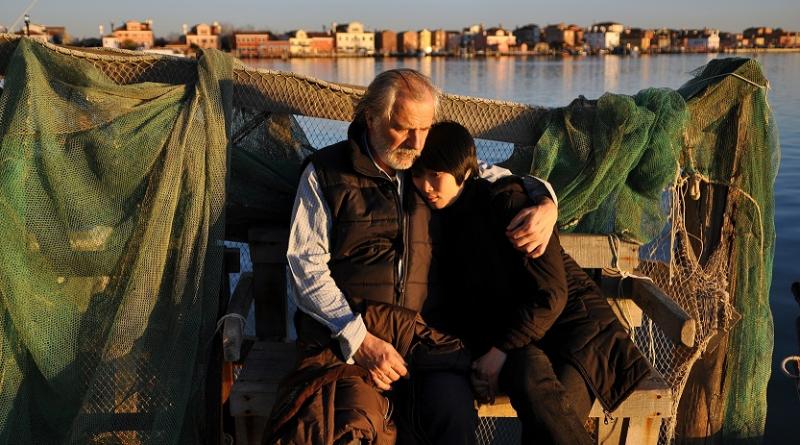Shun Li and the Poet | reviews, news & interviews
Shun Li and the Poet
Shun Li and the Poet
Feelings develop across nationalities in tender story of friendship frustrated

Italian documentarist Andrea Sigre’s first feature captures with great tenderness the delicate balance of friendship that grows up between two characters who live as relative outsiders in their community.
Li mostly has factory jobs, though there’s no element involving exploitation of foreign workers here - the only drawback in her position involves sharing accommodation with fellow Chinese workers noisier than she is. We hear her first as she explains in overvoice the tradition of floating candlelit lanterns on water to honour the soul of a Chinese poet, only for the camera to pull back to show that they are bobbing in a cramped bathtub, a boisterous game of mah-jong proceeding in the background.
The film’s small flower of mutual understanding is destroyed as quickly as it had budded
Li (Tao Zhao, best known as Chinese director Jia Zhangke’s favourite in films like Still Life) has a sadness to her, dreaming of the son whom she has left behind in China; he’s due to join her at some unspecified point in the future (“they decide when”), after she has obediently worked off her own passage and earned sufficient credit to fund his journey.
An unexpected transfer to Chioggia, a small town on the lagoon south of Venice, takes her out of her usual world, into a different, much more local community, to run a small bar for its new owner, the town’s only other Chinese presence. It’s the attractively unmodernised haunt of some of Chioggia’s fishermen, who continue with old fishing methods (pictured below right, checking the nets) alongside a slightly more modern existence. Shun Li’s arrival, with her haltingly accented Italian and gamin shyness, is greeted with gentle amusement, and a feeling of sympathy develops between her and Bepi (Rade Sherbedgia), who’s something of a poet himself as well as a fisherman now on the cusp of retirement. Recently widowed, he’d first arrived in Chioggia years ago from Yugoslavia across the Adriatic, so one of the things that draws the two together is a shared sense of coming from somewhere else.
 Their growing intimacy, though poetically platonic, nevertheless gives rise to the kind of suspicions that such small communities are prone to. The film’s small flower of mutual understanding is destroyed as quickly as it had budded, leaving only remembered moments of special understanding (echoes of another film about the unlikely coming-together of outsiders, and feelings developing across nationalities, Pawel Pawlikowski’s Last Resort?).
Their growing intimacy, though poetically platonic, nevertheless gives rise to the kind of suspicions that such small communities are prone to. The film’s small flower of mutual understanding is destroyed as quickly as it had budded, leaving only remembered moments of special understanding (echoes of another film about the unlikely coming-together of outsiders, and feelings developing across nationalities, Pawel Pawlikowski’s Last Resort?).
All this is gloriously caught in Luca Bigazzi’s water-coloured cinematography, which relishes the understated beauty of Chioggia’s homely surroundings (none of the grandeurs of nearby Venice here) in dark moody blues, especially well caught at times of fog or flood. This dominant tone of submerged sadness is made doubly poignant when set against the rare moments of illumination when the sun shines (main picture) on director Sigre’s intimate story.
François Couturier's score occasionally risks laying on the feelings over-emphatically, but it stops just on the right side of restraint, mingling Chinese elements with minor-key modulations. Shun Li and the Poet is a surefire heartwinner, and marks Sigre as a name to look out for.
Watch the trailer for Shun Li and the Poet
The future of Arts Journalism
You can stop theartsdesk.com closing!
We urgently need financing to survive. Our fundraising drive has thus far raised £49,000 but we need to reach £100,000 or we will be forced to close. Please contribute here: https://gofund.me/c3f6033d
And if you can forward this information to anyone who might assist, we’d be grateful.

Subscribe to theartsdesk.com
Thank you for continuing to read our work on theartsdesk.com. For unlimited access to every article in its entirety, including our archive of more than 15,000 pieces, we're asking for £5 per month or £40 per year. We feel it's a very good deal, and hope you do too.
To take a subscription now simply click here.
And if you're looking for that extra gift for a friend or family member, why not treat them to a theartsdesk.com gift subscription?
more Film
 London Film Festival 2025 - crime, punishment, pop stars and shrinks
Daniel Craig investigates, Jodie Foster speaks French and Colin Farrell has a gambling habit
London Film Festival 2025 - crime, punishment, pop stars and shrinks
Daniel Craig investigates, Jodie Foster speaks French and Colin Farrell has a gambling habit
 I Swear review - taking stock of Tourette's
A sharp and moving tale of cuss-words and tics
I Swear review - taking stock of Tourette's
A sharp and moving tale of cuss-words and tics
 A House of Dynamite review - the final countdown
Kathryn Bigelow's cautionary tale sets the nuclear clock ticking again
A House of Dynamite review - the final countdown
Kathryn Bigelow's cautionary tale sets the nuclear clock ticking again
 theartsdesk Q&A: Idris Elba on playing a US President faced with a missile crisis in 'A House of Dynamite'
The star talks about Presidential decision-making when millions of lives are imperilled
theartsdesk Q&A: Idris Elba on playing a US President faced with a missile crisis in 'A House of Dynamite'
The star talks about Presidential decision-making when millions of lives are imperilled
 Urchin review - superb homeless drama
Frank Dillane gives a star-making turn in Harris Dickinson’s impressive directorial debut
Urchin review - superb homeless drama
Frank Dillane gives a star-making turn in Harris Dickinson’s impressive directorial debut
 Mr Blake at Your Service review - John Malkovich in unlikely role as an English butler
Weird comedy directed by novelist Gilles Legardinier
Mr Blake at Your Service review - John Malkovich in unlikely role as an English butler
Weird comedy directed by novelist Gilles Legardinier
 Don't Let's Go to the Dogs Tonight review - vivid adaptation of a memoir about a Rhodesian childhood
Embeth Davidtz delivers an impressive directing debut and an exceptional child star
Don't Let's Go to the Dogs Tonight review - vivid adaptation of a memoir about a Rhodesian childhood
Embeth Davidtz delivers an impressive directing debut and an exceptional child star
 One Battle After Another review - Paul Thomas Anderson satirises America's culture wars
Leonardo DiCaprio, Teyana Taylor, and Sean Penn star in a rollercoasting political thriller
One Battle After Another review - Paul Thomas Anderson satirises America's culture wars
Leonardo DiCaprio, Teyana Taylor, and Sean Penn star in a rollercoasting political thriller
 Steve review - educator in crisis
Cillian Murphy excels as a troubled headmaster working with delinquent boys
Steve review - educator in crisis
Cillian Murphy excels as a troubled headmaster working with delinquent boys
 Can I get a Witness? review - time to die before you get old
Ann Marie Fleming directs Sandra Oh in dystopian fantasy that fails to ignite
Can I get a Witness? review - time to die before you get old
Ann Marie Fleming directs Sandra Oh in dystopian fantasy that fails to ignite
 Happyend review - the kids are never alright
In this futuristic blackboard jungle everything is a bit too manicured
Happyend review - the kids are never alright
In this futuristic blackboard jungle everything is a bit too manicured

Add comment